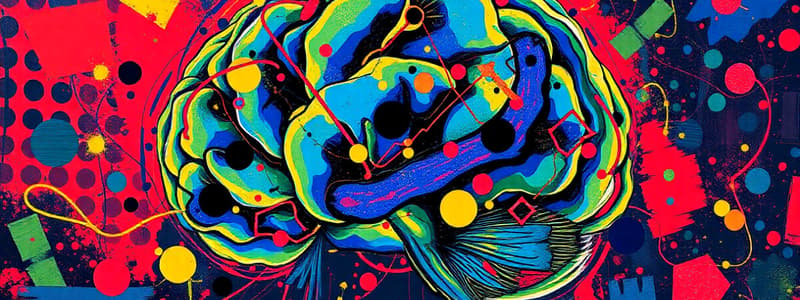Podcast
Questions and Answers
Glutamate is an inhibitory chemical that contributes to wakefulness.
Glutamate is an inhibitory chemical that contributes to wakefulness.
False (B)
The anterior hypothalamus is crucial for promoting wakefulness.
The anterior hypothalamus is crucial for promoting wakefulness.
False (B)
Caffeine acts as an adenosine receptor antagonist, enhancing the effects of excitatory neurotransmitters.
Caffeine acts as an adenosine receptor antagonist, enhancing the effects of excitatory neurotransmitters.
True (A)
The suprachiasmatic nucleus (SCN) is known as the brain's 'clock' and regulates melatonin release.
The suprachiasmatic nucleus (SCN) is known as the brain's 'clock' and regulates melatonin release.
Stages 3-4 of sleep are referred to as 'slow wave sleep' and are characterized by highly rhythmic EEG patterns.
Stages 3-4 of sleep are referred to as 'slow wave sleep' and are characterized by highly rhythmic EEG patterns.
Flashcards
Wakefulness
Wakefulness
State of being awake, controlled by the balance of excitatory and inhibitory neurochemicals in the brain.
Neural Control of Wakefulness
Neural Control of Wakefulness
Complex network in the brain that regulates wakefulness, including the reticular formation, basal forebrain, and locus coeruleus; these areas release neurochemicals like glutamate to maintain alertness.
Adenosine
Adenosine
Neuromodulator that accumulates during wakefulness, suppressing excitatory neurochemicals in the brain, and triggering sleep.
Caffeine's Effect
Caffeine's Effect
Signup and view all the flashcards
Sleep Stages
Sleep Stages
Signup and view all the flashcards
Study Notes
Wakefulness and Sleep Regulation
- Wakefulness Level: Determined by the balance of excitatory and inhibitory neurochemicals.
- Excitatory Chemicals: Glutamate, acetylcholine, dopamine, norepinephrine, orexin, histamine.
- Inhibitory Chemicals: GABA, melatonin, adenosine.
- Neural Control:
- Reticular Formation: Releases glutamate in the forebrain.
- Basal Forebrain: Releases acetylcholine in the forebrain.
- Locus Coeruleus: Releases norepinephrine in the forebrain.
- Hypothalamus: Crucial for wakefulness and sleep. Loss of cells in the posterior hypothalamus relates to encephalitis lethargica. Loss in anterior hypothalamus relates to fatal familial insomnia. Releases histamine and orexin to the forebrain. Loss of orexin-producing neurons in the hypothalamus causes narcolepsy.
- Suprachiasmatic Nucleus (SCN): The brain's internal clock. Controls the release of melatonin by the pineal gland.
- Caffeine: An adenosine receptor antagonist. Adenosine suppresses activity of excitatory neurochemicals, enhancing inhibitory GABA. Accumulates during wakefulness. Typical amounts in a cup of coffee and soda indicated. Lethal dose mentioned. Metabolism via CYP-IA2. Half-life ~ 4 hours. Active metabolites exist. Effects include cerebral vasoconstriction linked to headache relief, and possible protection against various diseases. Note the potential for anxiety exacerbation.
Sleep Stages
- Awake EEG: Highly variable.
- Sleep EEG: Becomes more rhythmic during stages 1-4. Stages 3 and 4 ("slow-wave sleep") are noted for prominent rhythms.
- Sleep is not inactivity: Brain activity continues even in sleep, becoming more rhythmic through stages as the hypothalamus sends less signals to the cortex
- REM Sleep: Tied to body temperature. Increased body temperature correlates with more REM sleep. REM deprivation causes REM rebound. Some drugs (e.g., barbiturates, alcohol) suppress REM.
Insomnia
- Comorbidity: Often linked with anxiety disorders.
- Types: Onset, maintenance, termination insomnia are distinguished.
- Body Temperature: Falling body temperature contributes to falling asleep, rising to waking up.
Sleep Aids
- Over-the-counter Sleep Aids: Often antihistamines.
- "Z drugs": Zolpidem (Ambien), Zaleplon (Sonata), Eszopiclone (Lunesta), Non-benzodiazepine receptor agonists (NBZRAs). Lower than a night's worth of sleep half-life is noted for the mentioned drugs. Differentiated by half-lives. Produce an amnesic effect.
- Ramelteon (Rozerem): Melatonin agonist. Questionable efficacy mentioned.
- Orexin Receptor Antagonists: Orexin = peptide neurotransmitter. Suvorexant (Belsomra) blocks orexin receptors to prevent arousal activation.
Studying That Suits You
Use AI to generate personalized quizzes and flashcards to suit your learning preferences.


